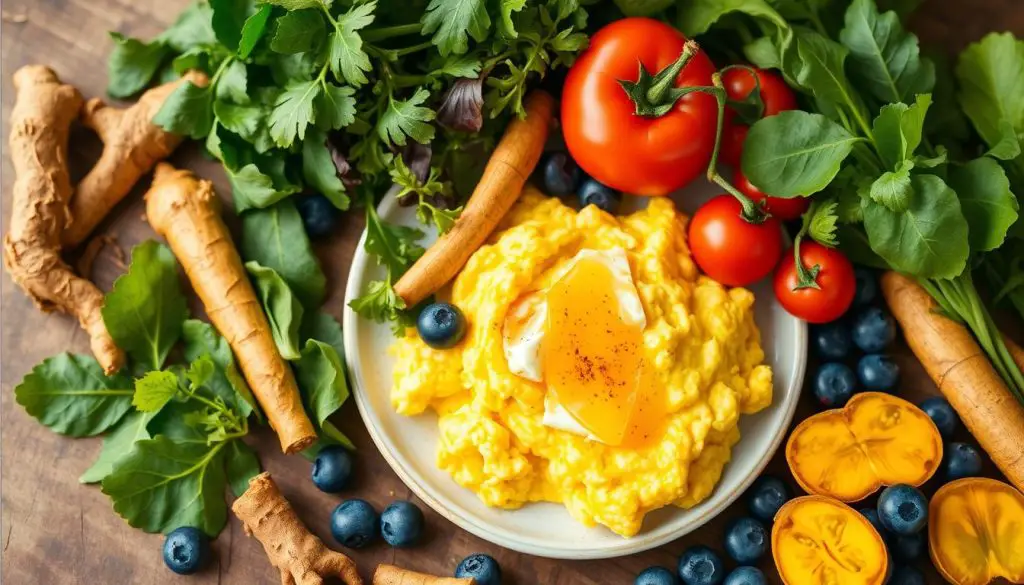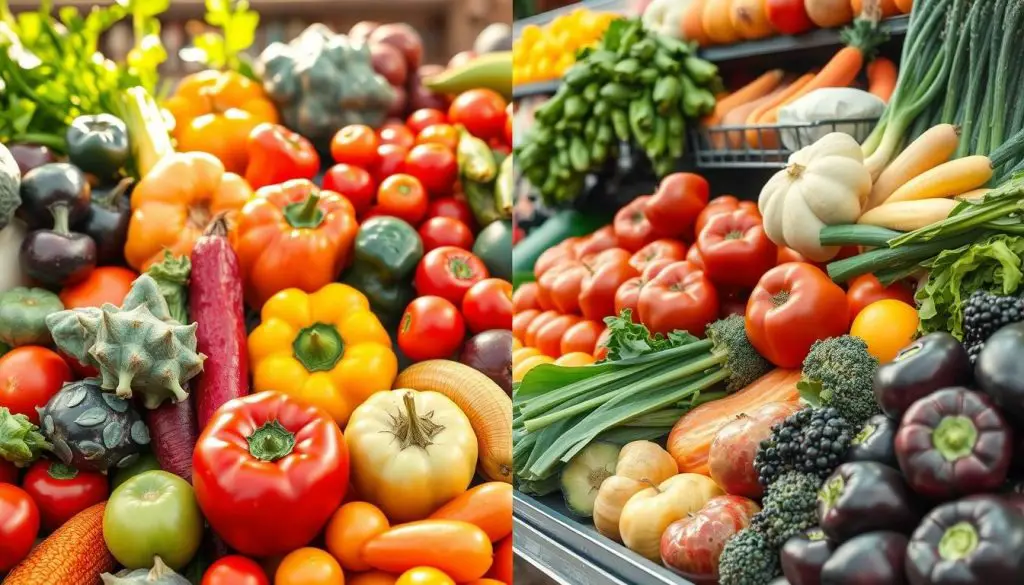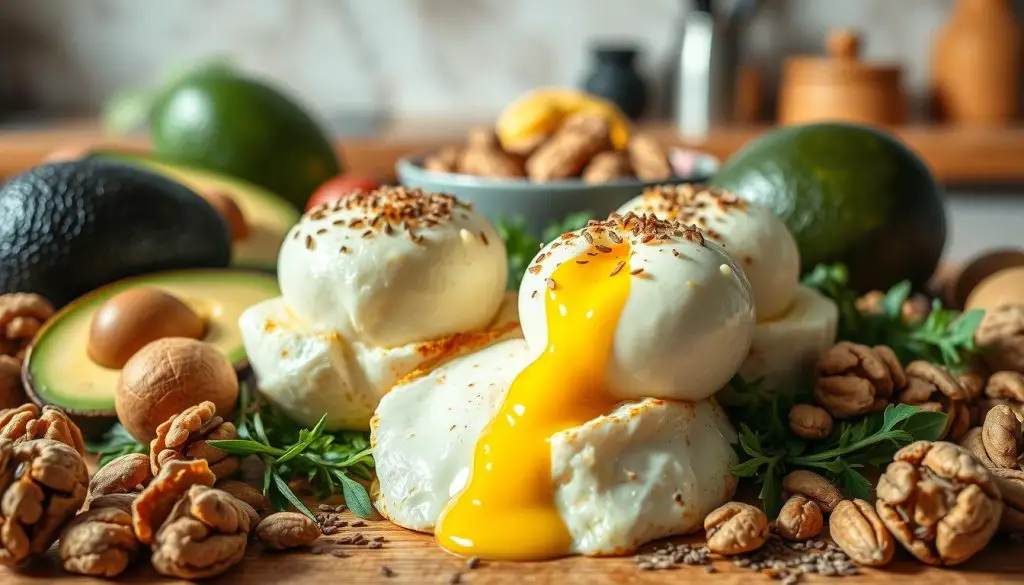Did you know 1 in 10 women have endometriosis? It’s a painful condition where uterine tissue grows outside the uterus. A low-inflammatory diet can help manage its symptoms. A simple meal of endo-friendly eggs and lactose-free cheese could change your life.
Eggs are packed with protein, vitamins, and minerals. They’re great for those with endometriosis. Choosing lactose-free cheese helps reduce inflammation and avoids digestive problems. Let’s dive into how this meal can boost your health.
Understanding Endometriosis and Its Dietary Implications
Endometriosis is a chronic condition that affects about 1 in 10 women in the U.S. It happens when tissue like the lining of the uterus grows outside the uterus. This tissue can grow on the ovaries, fallopian tubes, or other organs in the pelvis. The exact causes are not fully understood, but genetics, environment, and inflammation may play a role.
Symptoms of endometriosis can vary but often include severe pelvic pain, heavy or irregular bleeding, fatigue, and infertility. Doctors usually diagnose it with a laparoscopic procedure. There’s no cure, but treatments can help manage symptoms and slow the condition’s progression.
The Importance of a Low-Inflammatory Diet
Diet is key in managing endometriosis. Eating a low-inflammatory diet can help. Avoiding foods that trigger inflammation, like red meat and processed foods, and focusing on plant-based foods can reduce symptoms.
Here are some dietary tips for endometriosis:
- Eat lots of fruits and vegetables that fight inflammation.
- Add healthy fats like those in fish, nuts, and avocados to your diet.
- Limit or avoid dairy, gluten, and soy, as they can cause inflammation.
- Drink at least 8 glasses of water a day to stay hydrated.
- Consider taking vitamins A, C, D, E, and zinc to support your health.
By changing your diet, you can help manage endometriosis and improve your health.
The Benefits of Eggs for Endometriosis Management
Eggs are a great addition to our diet for managing endometriosis. They are packed with nutrients and can be part of a healthy meal plan.
Eggs are a rich source of high-quality protein, containing all the essential amino acids our bodies need. This protein helps support health and may reduce inflammation, a big factor in endometriosis. Eggs also have vitamins A, D, E, and B12, and minerals like iron and zinc.
Studies show that foods rich in antioxidants, fiber, iron, omega-3 fatty acids, and protein can help with endometriosis. The nutrients in eggs, including their anti-inflammatory properties, make them a great choice for managing endometriosis.
A study found that low iron levels can lead to endometriosis. Foods like eggs, poultry, and salmon are rich in iron. Omega-3 fatty acids in salmon and walnuts also help manage endometriosis.
In an endo-friendly diet, eggs are a valuable asset. They offer a variety of tasty and nutritious meal options. These can help improve health and well-being for those with endometriosis.
Lactose-Free Cheese Alternatives for Endometriosis
For those with endometriosis, cheese can be a big problem. This is because lactose and hormones in dairy might cause inflammation. Luckily, there are many lactose-free and dairy-free cheese options now. These plant-based cheeses taste and feel like the real thing but don’t have the dairy issues.
Almond-based cheese is a favorite for its creamy, mild taste. Cashew-based cheeses are also great, mimicking the richness and meltability of dairy. Coconut-based cheeses add a sweet flavor and a special texture.
When picking lactose-free or dairy-free cheese, always check the labels. Look for products that are made to be safe for endometriosis. Stay away from any dairy or additives that could cause inflammation. Choose options that are simple, made from whole plants.
Adding these cheese alternatives to your meals can make cooking fun again. You can use them in grilled cheese, on salads, or in baked dishes. These substitutes let you enjoy cheese without the bad effects.
Trying out lactose-free and dairy-free cheese can really change things for those with endometriosis. These new options let you enjoy the taste and texture of cheese while keeping your body healthy.
Endo Friendly Eggs Lactose-Free Cheese
For those managing endometriosis, a meal with endo-friendly eggs and lactose-free cheese is tasty and healthy. Eggs are packed with protein and important vitamins and minerals. Lactose-free cheese gives you the cheese taste and texture without the dairy’s inflammation.
Together, these ingredients make a meal that’s good for you and helps with endometriosis symptoms. Studies show that eating low-mercury seafood, whole grains, fruits, and veggies can boost fertility in those with endometriosis.
Also, foods full of antioxidants like fruits, veggies, nuts, seeds, and fatty fish can cut down inflammation and pain from endometriosis. Foods rich in magnesium and zinc, like whole grains, nuts, seeds, dairy, beef, and seafood, also help reduce inflammation.
| Nutrient | Benefits for Endometriosis |
|---|---|
| Protein (Eggs) | Supports tissue repair and muscle function |
| Omega-3 Fatty Acids (Lactose-Free Cheese) | Reduces inflammation and pain |
| Magnesium and Zinc (Nuts, Seeds, Dairy) | Aids in relaxing muscles and regulating menstrual cycles |
Adding endo friendly eggs and lactose-free cheese to your meals makes for a tasty and healthy choice. It supports your health and helps manage endometriosis symptoms.
Low FODMAP Diet and Endometriosis
Living with endometriosis can be tough, but diet might help. The low FODMAP diet is getting attention for easing gut symptoms.
Navigating the Low FODMAP Diet for Endometriosis
FODMAP stands for Fermentable Oligosaccharides, Disaccharides, Monosaccharides, and Polyols. These carbs are hard to digest for some, like those with endometriosis. A low FODMAP diet can cut down on bloating and gas.
The diet means avoiding high-FODMAP foods. This includes some fruits, veggies, grains, and dairy. You’ll eat more meat, poultry, fish, nuts, and some fruits and veggies instead.
Stick to the diet for 4-6 weeks with a dietitian’s help. This lets you figure out what foods bother you and how to add them back in.
Adding the low FODMAP diet to your treatment plan might help your gut health. It could also lessen your symptoms.
Everyone’s body is different. What works for one person might not work for another. Always talk to a healthcare pro to find the right diet for you.
Anti-Inflammatory Foods for Endometriosis
Managing endometriosis needs a whole-body approach. Eating anti-inflammatory foods is key. Studies show that an anti-inflammatory diet can lessen pain and symptoms.
Omega-3 fatty acids are important for endometriosis. You can find them in fatty fish like salmon and mackerel. Plant-based options include walnuts, flaxseeds, and chia seeds. These foods help reduce inflammation and pain.
It’s also important to eat foods high in antioxidants. Berries, leafy greens, and bell peppers are full of these compounds. They fight inflammation and oxidative stress, which are linked to endometriosis.
But, it’s important to avoid foods that can make symptoms worse. Stay away from processed meats, refined carbs, and fried foods. They can make inflammation worse and slow down healing.
Eating a diet rich in anti-inflammatory foods endometriosis can help manage symptoms. An endometriosis diet with endo-friendly foods is a powerful tool. It helps regain control over this chronic condition.
| Anti-Inflammatory Foods | Pro-Inflammatory Foods to Avoid |
|---|---|
|
|

Meal Prep and Recipes for Endo-Friendly Eggs and Lactose-Free Cheese
Using endo-friendly eggs and lactose-free cheese in your meals can really help with endometriosis symptoms. Meal prepping these ingredients saves time and makes sure you have healthy foods all week. It’s a great way to fight inflammation.
Endo-Friendly Egg Recipes
Begin your day with a protein-rich breakfast that includes endo-friendly eggs. Try hard-boiling a batch of eggs for quick snacks or to add to salads and bowls. Making a frittata or quiche with lactose-free cheese and veggies is also a breeze.
- Breakfast Burrito with Scrambled Eggs and Lactose-Free Cheese
- Baked Potato with Broccoli and Lactose-Free Cheese
- Spinach Salad with Hard-Boiled Eggs and Lactose-Free Cheese Dressing
For lunch or dinner, add endo-friendly eggs to your meals. A endo-friendly egg salad or endo-friendly egg muffin is both tasty and easy to make.
Lactose-Free Cheese Recipes
Lactose-free cheese is a great addition to your diet. Look for cheeses made from alternative milks like lactose-free cow’s milk, goat’s milk, or plant-based milks. Use it in baked potatoes, frittatas, or even a lactose-free cheese dressing for salads.
Remember, meal prep endometriosis is essential for healthy meals all week. Preparing endo-friendly eggs and lactose-free cheese ahead of time makes cooking easier. It helps you focus on nourishing your body.
Organic vs. Non-Organic: What’s Best for Endometriosis?
Choosing between organic and non-organic produce is key for managing endometriosis. Pesticides like organochlorines and organophosphates can harm our health. Opting for organic produce is wise, as it reduces exposure to these chemicals.
Organic foods are better for our health, which can help ease endometriosis symptoms. Non-organic foods, on the other hand, may contain harmful pesticides. These can lower our antioxidant levels and disrupt hormones, worsening endometriosis.
| Organic Food | Non-Organic Food |
|---|---|
| Higher in antioxidants and nutrients | May contain harmful pesticides endometriosis |
| Reduces exposure to endocrine-disrupting chemicals | Potential hormonal imbalances |
| Supports overall health and wellness | Increased risk of inflammation and oxidative stress |
Switching to organic food endometriosis is a big step towards better health. It’s a small change that can greatly improve our lives.

Hidden Hormones in Food and Their Impact on Endometriosis
People with endometriosis need to think about the hormones in their food. Dairy and meat products might have hormones that make hormone imbalances worse.
These hormones in food can mess with our body’s hormonal balance. This might make endometriosis symptoms worse. Choosing organic, hormone-free options or dairy-free and plant-based alternatives can help.
Understanding Endometriosis and Hormone Imbalances
Endometriosis is a chronic condition where tissue grows outside the uterus. It’s linked to hormonal imbalances, like too much estrogen.
Stress, being overweight, a bad diet, and xenoestrogens can worsen endometriosis hormone imbalance. It’s important to tackle these causes to manage symptoms and improve health.
| Hormone Imbalance in Endometriosis | Potential Consequences |
|---|---|
| Estrogen Dominance | PMS, infertility, fatigue, hot flashes, decreased libido, headaches, depression, uterine fibroids, various types of cancer |
| Thyroid Hormone Imbalance | Thyroid conditions, including Hashimoto’s disease and thyroid cancer |
Knowing how hormones in food affect endometriosis helps us make better choices. This can improve our health and manage our condition better.
Omega-3 and Endometriosis: The Importance of Healthy Fats
For those with endometriosis, diet and nutrition are key. Healthy fats, like omega-3s, are very important. They are found in fatty fish, walnuts, and flaxseeds. These anti-inflammatory fats help manage symptoms.
Research shows that eating more omega-3 fatty acids can lower endometriosis risk by 22%. On the other hand, eating pro-inflammatory fats from fried and processed foods can raise risk by up to 48%. It’s vital to eat the right fats for those with endometriosis.
Other anti-inflammatory fats like monounsaturated and polyunsaturated fats are also helpful. Foods like avocados, olive oil, and nuts are good sources. They can help reduce inflammation and ease symptoms.

The link between diet and endometriosis is complex, and effects can vary. Yet, choosing anti-inflammatory fats and avoiding pro-inflammatory fats can help manage the condition. It’s a step towards better health and well-being.
Dairy-Free Alternatives for Endometriosis
For those with endometriosis, dairy can make symptoms worse. This is because lactose and hormones can cause inflammation. Luckily, there are many dairy-free options that are good for an endo-friendly diet. Almond milk, oat milk, cashew milk, and coconut milk are all great choices. They have calcium and other nutrients without the dairy.
Dairy-free cheese substitutes are also available. They’re made from nuts, seeds, or plants. These alternatives let you enjoy cheese’s taste and texture without the dairy. This is a big win for those with endometriosis.
Exploring Dairy-Free Alternatives
- Almond milk – Provides calcium, vitamin E, and healthy fats to support endometriosis management.
- Oat milk – Rich in fiber, vitamins, and minerals, making it a nutritious dairy-free choice.
- Cashew milk – Creamy texture and a good source of magnesium, which can help regulate menstrual cycles.
- Coconut milk – Contains anti-inflammatory medium-chain triglycerides (MCTs) that may benefit endometriosis symptoms.
- Dairy-free cheese alternatives – Made from nuts, seeds, or plant-based sources, providing the cheese experience without dairy.
Trying these dairy-free options is a big step for managing endometriosis. They help reduce inflammation through diet. Adding these alternatives to meals and snacks can greatly improve your health and life quality.
Gluten and Endometriosis: Should It Be Avoided?
The link between gluten and endometriosis is a topic of ongoing debate. Some studies suggest a gluten-free diet may help with symptoms. Yet, others have found no clear connection. If you have endometriosis, trying a gluten-free diet might help.
But, it’s key to talk to a healthcare professional before changing your diet. The effect of gluten endometriosis varies for everyone. Some people find a gluten-free endometriosis diet helps, while others don’t see a difference.
Remember, a gluten-free endometriosis diet isn’t right for everyone. It can lead to nutrient deficiencies if not balanced. Make sure you get all the vitamins, minerals, and fiber you need from other foods.
If you try a gluten-free diet, watch how your body reacts. Keep track of any changes in your symptoms. This will help you see if avoiding gluten is good for you.

In the end, deciding to avoid gluten for endometriosis should be a team effort. Talk to your healthcare provider to create a diet plan that fits your needs and concerns.
Implementing an Elimination Diet for Endometriosis
Living with endometriosis can be tough. An elimination diet might help manage symptoms. It involves removing certain foods to find out what triggers our condition.
The endometriosis diet means cutting out dairy, gluten, and high-FODMAP foods. Then, we slowly add them back to see if we react. This way, we learn what foods work best for us.
Getting help from a healthcare pro or dietitian is key. They guide us through the diet safely. They help us keep our nutrition balanced and make lasting changes. By managing our diet, we take charge of our health.
Source Links
- https://www.usenourish.com/blog/endometriosis-diet-grocery-list
- https://thedietologist.com.au/endometriosis-diet-myths/
- https://www.ssmhealth.com/SSMHealth/media/Documents/slucare/services/obstetrics-gynecology-womens-health/endometriosis-diet-booklet.pdf
- https://www.endofound.org/10-foods-endo-women-should-avoid
- https://www.abbeyskitchen.com/diet-for-endometriosis/
- https://www.health.com/condition/endometriosis/endometriosis-diet
- https://www.bswhealth.com/blog/endometriosis-diet-what-to-eat-if-you-have-endometriosis
- https://drkathleenmahannah.com/blog/endometriosis-foods-to-eat-and-avoid
- https://endo-metrix.com/endometrix-blog/guide-to-anti-inflammatory-plant-based-foods
- https://www.verywellhealth.com/endometriosis-diet-7105372
- https://www.medicalnewstoday.com/articles/326102
- https://www.runningbugfarm.com/blog/the-30-minute-low-fodmap-cookbook-101-delicious-recipes-to-soothe-ibs-and-other-digestive-disorders
- https://thedietologist.com.au/best-diet-for-endometriosis/
- https://nzendo.org.nz/endo-news/low-fodmap-diet/
- https://www.everydayhealth.com/womens-health/essentials-of-endometriosis-diet.aspx
- https://sofreshnsogreen.com/recipes/endometriosis-diet-recipes/
- https://www.healendo.com/food-inspo
- https://www.everydayhealth.com/crohns-disease/diet/breakfast-recipes-people-with-crohns/
- https://www.healendo.com/blog-1/2019/9/24/dairy-nutrient-density
- https://drjockers.com/endometriosis/
- https://healthunlocked.com/endometriosis-uk/posts/143148661/endometriosis-diet-meal-ideas-informative-post-add-yours-to-it-and-share
- https://drbeckycampbell.com/how-to-improve-estrogen-imbalance-naturally/
- https://catherinechong.com.au/how-to-get-pregnant-with-endometriosis/
- https://www.ncbi.nlm.nih.gov/pmc/articles/PMC8972862/
- https://youngwomenshealth.org/wp-content/uploads/2014/10/Endometriosis-Parent.pdf
- https://health.clevelandclinic.org/endometriosis-diet
- https://www.myendometriosisteam.com/resources/endometriosis-diet-foods-to-eat-and-foods-to-avoid
